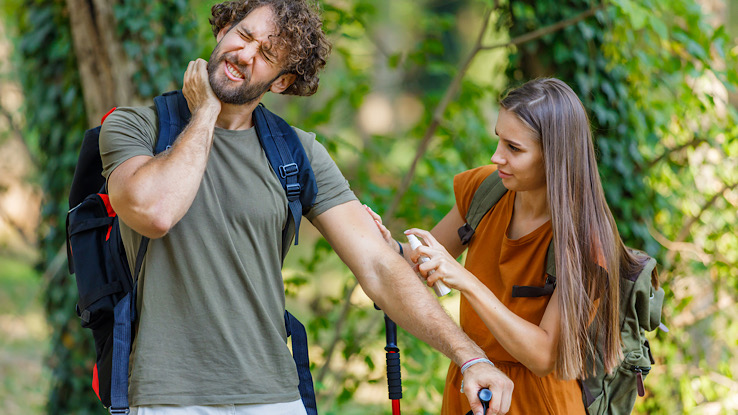
Traveling is an exciting, character-building activity that provides memories to last a lifetime. Travel should be fun, lighthearted, and exhilarating. However, there are some travel hazards you should be prepared for before starting your journey. One of the hazards is traveling to certain regions with a high risk of malaria infection. Learn about different malaria medications for travel.
What Is Malaria?
Malaria is an infection spread by the bite of an infected mosquito. There are over 500 million malaria cases worldwide every year and over 1 million deaths. Over 40% of the world’s population lives in a region where malaria is endemic. These regions include Western and Sub-Saharan Africa, South Asia, the Western Pacific, and South America.
Malaria is not contagious from person to person. However, mosquito bites can still spread from an infected person to someone who isn’t infected. There are about 2,000 cases of malaria in the United States per year. However, that number can grow if you do not take preventative measures like malaria medications for travel before your departure. Because symptoms can take weeks to develop, a traveler may return home carrying the disease. If a mosquito bites them upon their return, that mosquito becomes a carrier and can infect other people.
What Are the Symptoms of Malaria?
It’s important to know the signs and symptoms if you know you’re traveling to a high-risk destination. Most symptoms do not show up until weeks after the initial infection, which can often lead to severe complications.
Symptoms of malaria include:
- Fever and flu-like sickness
- Stomach issues such as vomiting and diarrhea
- Muscle aches and chills
- Fatigue
- Anemia
- Jaundice due to a loss of red blood cells.
If you don’t treat malaria infection quickly, serious complications such as kidney failure, seizures, comas, and death can occur.
How Is Malaria Treated?
Fortunately, prescription drugs are available to treat malaria. Treatment varies based on your age, the region you were infected, the severity of symptoms, and whether or not you are pregnant.
Chloroquine is the preferred drug to treat all parasitic infections. However, in many countries with high malaria cases, mosquitos have become resistant to the medications used to treat malaria. This is why prevention is important if you are traveling to a country with a high risk.
Malaria Medications For Travel

To keep yourself safe while you travel, talk to your doctor about malaria pills for travel. There are many types of preventative medications you can take before traveling. Your doctor will ask you how long until your trip, where you will visit, and how long your trip will be — they will then create a care plan based on that timeline. There are a few popular malaria pills for travel, including:
- Chloroquine is a pill that you take once a week. You usually start taking this medication 1-2 weeks before you travel, once a week during travel, and once a week for 4 weeks after returning home from your trip. You should not use this medication if traveling to a chloroquine-resistant region.
- Malarone is a good option if your trip is on short notice. You begin taking Malarone once a day 1-2 days before your trip, every day you’re away, and 7 days following your return home.
- Doxycycline is an antibiotic taken daily. You will begin taking Doxycycline 1-2 days before your trip, once a day during, and for 7 days after returning home.
- Mefloquine can be an option if you are pregnant and in your second or third trimester while traveling. It is considered a safe drug to use before, during, and after travel.
Tell your doctor if you have any allergies or medication sensitivities. Your doctor will consider your medical history and determine the best course of action for malaria preventatives.
There are no approved malaria vaccines, and we are currently in the beginning stages of clinical trials for a vaccine.
Additional Tips For Preventing Malaria
In addition to medication, there are other things you can do on your own to help keep you safe while traveling. Some actions are basic, and you can take care of these on your own before your trip, including:
- Insect repellent: Pack lots of insect repellant. Make sure your bug spray contains a high concentration of DEET — the chemical that protects against malaria. Reapply every few hours for better protection.
- Treat your clothes with insecticide: This will double your protection and keep mosquitos off your clothing.
- Pack long-sleeved shirts and pants: If you’re spending a lot of time outdoors during your trip, pack clothes that cover your arms and legs. The less skin you expose to the elements, the lower your risk for malaria.
- Mosquito net: Pack a mosquito net to drape over your bed while you sleep. This is especially important in tropical destinations where mosquitos are more active after dark.
- Avoid rainy season travel: Mosquitos thrive in moist, humid environments. So try not to travel during the rainy season if you can.
Plan Smart, Travel Smart
Plan for your trip as far in advance as you can. It is ideal if you can start taking your malaria pills for travel as early as possible. If you stick to the advice of your doctor, take your travel malaria pills as prescribed, wear protective clothing, and use a mosquito net while you sleep, you will be well protected from malaria.






